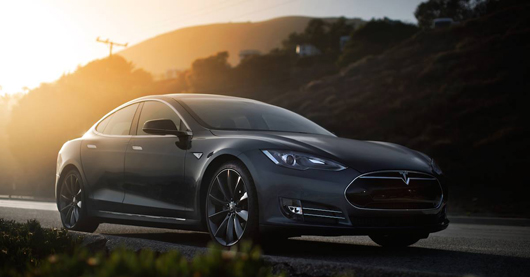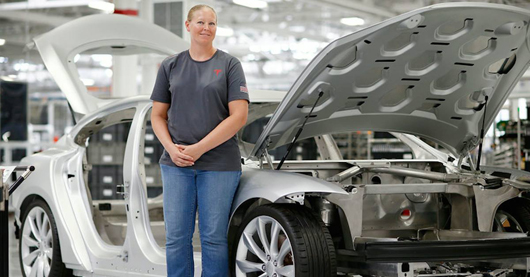
Nov 21: The L.A. Auto Show kicked off Tuesday with press days focused on the technology of the "connected car," which will eventually help lead to self-driving cars, like those that Google (NASDAQ:GOOGL) and recent auto-tech IPO Mobileye (NYSE:MBLY) have been working on.
Volvo, for one, showcased in a news conference Tuesday that, like Google, its cars can drive themselves now — following lanes, adapting speeds and merging into traffic.
"The first prototypes are out and running," Volvo Technical Specialist Erik Coelingh told IBD at the auto show, beside a Volvo outfitted as a "Drive Me" autonomous vehicle. "We've selected a number of commuter roads in Gothenburg on which we'll allow for self-driving in 2017 — and already we are driving around with prototypes like these."
On Swedish public roads, engineers accompany the autonomous cars for testing now. As a luxury car maker, Volvo sees providing autonomous driving capability for when a driver doesn't want to drive, for instance on a boring commute. But Coelingh said that there's a significant opportunity to improve safety via autonomous driving too.
The technology for self-driving, robotic or autonomous cars — whatever catchphrase eventually sticks — is largely here today and incorporates things like cameras and sensor systems.
Volkswagen's (OTCPK:VLKAY) Audi showcased its automated auto developments at the car show too. Its partnership with chipmaker Nvidia (NASDAQ:NVDA) underlies a significant part of the effort.
Assisted, Not Autonomous
"There are many different ways in which drivers are assisted today already," Anupam Malhotra, Audi of America's manager of connected vehicles, told IBD at the auto show. "You have side-warning lane-change management, you have adaptive cruise control systems, all these systems are already present in the cars. Piloted driving requires one additional step beyond that, a lateral-dimension sensor we add onto the car, called Lidar."
Lidar measures distance by using a laser for illumination and analyzing the reflection.
"Once that module's added on," Malhotra said, "you take all the input from these sensors and cameras, and you build it into the decision process that's built around how the car handles."
Audi is now testing piloted driving in California. It got a license to do so in Las Vegas a year ago.
"So this is something that is real, these cars are capable of driving themselves," Malhotra said. "Of course, in order for it to be street legal, there are a number of regulatory and social hurdles that still need to be leaped. But Audi is working on a process to actually bring this into production within the decade."
Besides Nevada and California, Florida and Michigan also allow testing of driverless vehicles on public roads.
Tesla, Mobileye Team Up
Luxury electric car maker Tesla Motors (NASDAQ:TSLA) said last month that it was adding lane-change and speed warning capabilities to new Model S sedans. The "autopilot" feature, with 360-degree ultrasonic sonar and long-range radar, means that the car will eventually be able to recognize traffic lights and people, and do self-parking and active emergency braking.
Tesla is working directly with advanced driver-assistance system (ADAS) developer Mobileye, whose stock leapt 48% in its Aug. 1 trading debut. Mobileye is also working with a number of big-name carmakers such as General Motors (NYSE:GM) and Honda (NYSE:HMC), though mostly through relationships with their suppliers.
Mobileye reports earnings on Thursday.
Morgan Stanley analyst Ravi Shanker has said he expects roughly half of new cars sold globally to have an advanced driver-assistance system or autonomous system by 2022.
One Step At A Time
But "what we need to do is get semi-autonomous right first," said Renee Stephens, vice president of automotive quality at consulting firm J.D. Power, speaking at the auto show. Then she showed a funny video of people trying to get their voice-interactive navigation systems to understand what they really said.
J.D. Power's research shows that some technologies are making sense to consumers. All-around car camera systems are favored by 72% of drivers polled. But other technologies were less popular, such as eye-tracking controls, which only 22% saw as adding value. (They can be an integral part of active-safety technologies that recognize when a driver is distracted.)
For now, the term "connected cars" refers to a whole array of enhanced communications, entertainment and safety features — from voice-interactive control of the car's music and maps to how a vehicle interacts with smartphones, to how cars may one day use Wi-Fi communications between themselves to help detect traffic.
Are customers asking for connected cars now?
Yes, says Jason Schulz, manager of strategic partnerships at Toyota Motor (NYSE:TM) Sales, though they want a simple experience and some have price constraints.
"As you start to look at the segment going from nonluxury to luxury, demand increases," he said at the auto show. "Nonluxury buyers see themselves going from maybe analog to digital, making that shift. And our luxury buyers see connected services really as a natural part of the premium experience — so demand is definitely increasing."
However, he said, what's really interesting is that "those with a connected car today cannot imagine a world without a connected car as their next vehicle purchase."
The idea of an autonomous car is "at an interesting point where it has acquired momentum far ahead of what many people anticipated," said Jeremy Acevedo, an analyst at car-shopping site Edmunds.com. "A lot of the components needed to make cars autonomous are right here at our fingertips, and it seems like a lot closer than a little while ago."
So when they're finally available to the public, how much will autonomous capabilities add to the cost of a car?
Too early to say, according to Audi's Malhotra, though he notes that the technology continues to improve and Audi has, with Nvidia, been able to reduce the size of the control unit — and things like that can end up reducing costs. It looks roughly the size of an Apple iPad Mini.






Comments
Add new comment